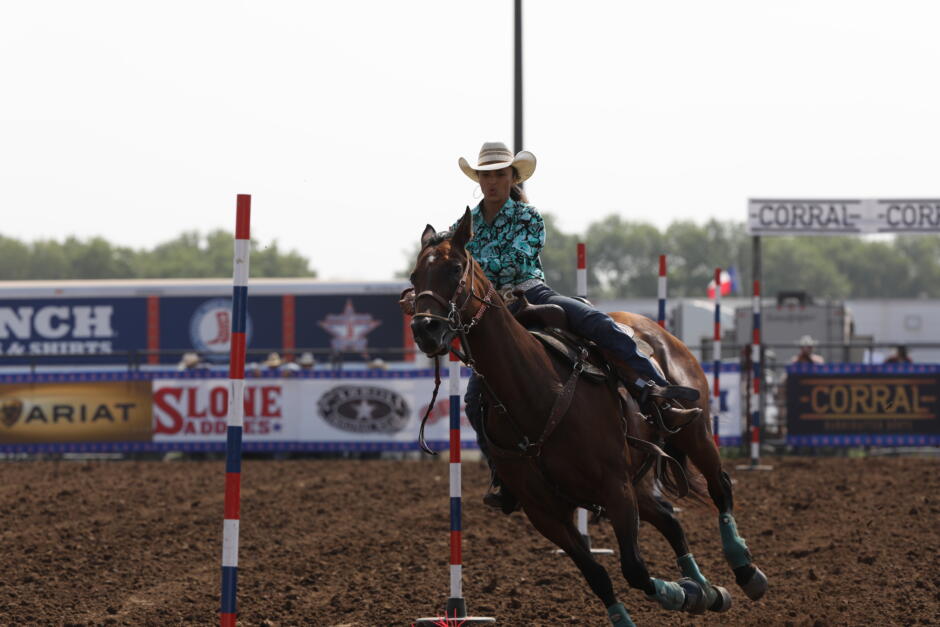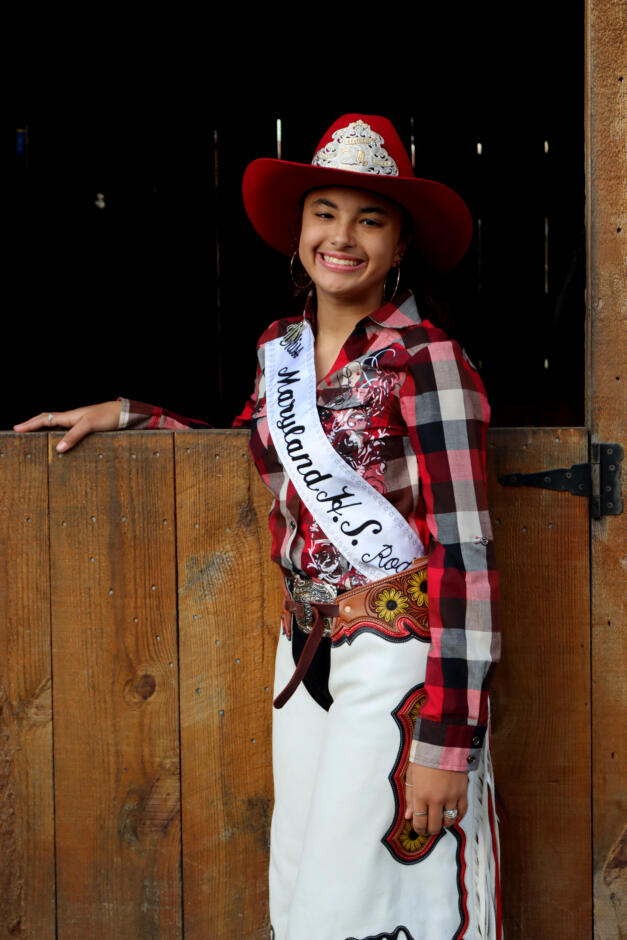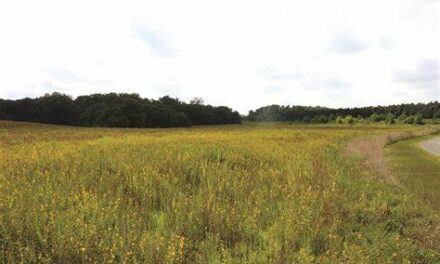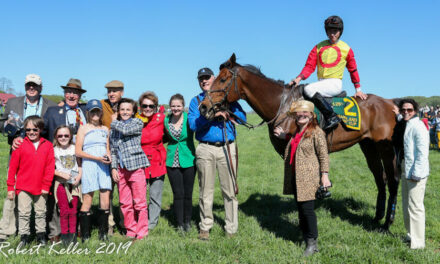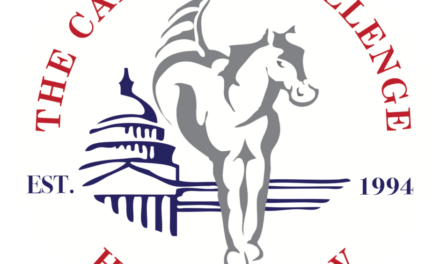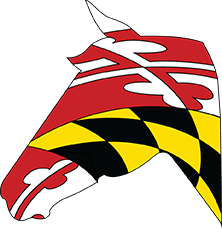by Katherine O. Rizzo (first published in the February 2022 Equiery)
When 15-year-old Maryland High School Rodeo Association (MDHSRA) member Morissa Hall rode into the Las Vegas Convention Center in Nevada for her first round at the 2021 Junior World Finals, she felt nervous. Nervous because it was a huge rodeo with tons of atmosphere. Nervous because she was about to enter the biggest rodeo she had done to date on a horse she had only been riding for a few weeks.
“It was nerve-racking but also calming because I just had to remind myself that this is a show just like any other show and I need to do my best and put in the same amount of effort,” she said. “I tried to overpower my nerves and just let her go but then she had so much power and I got in her face and we went too wide and missed a turn.”
The mistake cost Morissa a first round score as she broke pattern in the Poles 17 & Under division. Morissa may have left the ring disappointed in that moment but she was not defeated.
Crash Course in Rodeo
The expression “born in the saddle” is common among many riders. Although others in her family ride horses, Morissa did not start riding seriously until a few years ago. “Our family reunions had horses and pony rides and I’ve always loved animals of all types,” she explained. “But we didn’t purchase any horses and start rodeos until three years ago.”
While her mother rides recreationally and her sisters used to take English-style lessons at Equilibrium Horse Center, Morissa, who lives with her father at their farm in Upper Marlboro, turned to rodeo. “It’s what I was first exposed to,” Morissa said as she went on to talk about attending the Bill Pickett Rodeo at the nearby Prince George’s Equestrian Center every year when she was younger.
“We have a lot of friends who rodeo too, so the people we knew were already in rodeo,” her father Morse Hall said, adding that their family is close friends with Cory Jackson, whose son Nicholas is a fellow MDHSRA member. “Our kids have known each other for nine years. His kids were already competing in rodeo and we just went along with friends.” Nicholas is a champion teen bull rider who finished fourth in the final round of the Bull Riding 12-13 yrs division at the 2021 Junior World Finals.
Morissa competed in her first official rodeo in 2018 when she participated in a multi-state rodeo at the Howard County Fairgrounds sponsored by MDHSRA. “They let the kids try it out before joining to see if they even like it,” Morse said. For that first rodeo, she was riding the family’s Paint horse Apache, who had previously been trained for Dressage and Western Pleasure. Morissa and Apache competed in Barrels,
Poles and Goat Tying. “That’s when we found out that Apache didn’t like anything about rodeo!” she said with a chuckle.
Like many sports, there are ups and downs, but through it all, Morissa never gave up and focused on one goal: learning how to succeed. Without any formal lessons and with her father as her coach and cheerleader, Morissa learned about the sport and about riding as she went. “My dad always tells me you have to ride every stride,” she said. “It’s something I have to keep working on. Being more focused.”
Morissa’s perseverance paid off when she got to ride on an experienced barrel horse named Wranglelena.
The Competitive Edge
Although Morissa was learning quickly as she went from rodeo to rodeo, to be competitive in any equestrian sport takes a competitive equine partner. “This entire way of life takes money,” Morse stated. “At some of these rodeos we’re up against people who have multiple ranches across the country. And for the rest of the world that doesn’t have those resources, how do you compete with that?”
Morse, who is a physical therapist and has learned to be a rodeo coach along the way, added, “As a parent and a provider we have to ask ourselves, ‘what are you going to do to help your kid succeed?’” Building connections was one solution that came naturally to the Hall family with so many friends already invested in the sport.
“There are no short cuts in equestrian sports,” he said. “This is a sport where you can’t just get off the couch and go compete. You have to get on another animal that has a mind of its own and become a partner with it to do well.” Morse also commented that his training in physical therapy has helped as he is trained to see movement. “It helps me teach Morissa how to sit properly and how every move she makes affects the horse,” he explained.
Apache may have helped Morissa get started, but her next mount helped her become competitive. “We were at a rodeo and Thomas Allen came up to us after one of Morissa’s runs and we got talking about a next horse for her and he just up and offered us Lena,” Morse said. The Halls now consider Allen Morissa’s “Rodeo Grandpa” for all the times he has helped Morissa at rodeos. “To be given the opportunity is what we are so grateful for,” Morse said adding with a laugh, “We didn’t really know what we were getting into at first though.”
Morissa described her first few rides on Wranglelena, a 19-year-old registered American Quarter Horse, as “terrifying but fun.” She explained, “Lena used to just take off and was really hard to work with but we learned to trust each other and things got better.”
A prime example of Lena’s sometimes expressive behavior came at the first rodeo Morissa took her to, the Battle By the Bay in 2020. It took five other girls on horseback to help her get into the arena. “Lena just wouldn’t go in and the other girls just came together to help Morissa out,” Morse said. “That’s the type of family rodeo is.”
Morissa and Lena qualified and competed at the National High School Rodeo Finals (NHSRF) in July 2021 in Lincoln, Nebraska, where they rode in Barrel and Poles. Morissa was the youngest competitor there. “Let’s not talk about my first run,” Morissa said with a laugh. “It was horrible! I let the anxiety of it being my first run get to me.” She was able to push the competition jitters aside and put in better runs after that. “The others were really great!”
She finished 125th out of 180 in Barrels and 58th out of 180 in Poles that year. Her best time in Barrels was only 2.366 seconds slower than the winner. Her fastest Poles run was even closer. “That is how tight these things are,” Morse said.
In addition to riding at the NHSRF, Morissa competed in the Queen Competition representing MDHSRA where she became the first Marylander to ever win a phase when she won the “Impromptu Question” phase of the Queen Competition. Overall, she finished 20th, which is the highest placing a Maryland Queen has achieved at the NHSRF.
“This is all just a real blessing… that we have had the success we have had,” Morse said. “All of this has been because of people who have poured themselves into Morissa.”
A Rodeo Queen
Now a sophomore at Elizabeth Seton High School where she is an honors student, Morissa takes the responsibilities of being named MDHSRA Queen very seriously. “Our job is to promote our association when we are out at rodeos and places,” she said. “And to coordinate fundraisers, coordinate the Grand Entry at each rodeo and bring the team together.”
“Maryland is a smaller chapter compared to others but we have grown a lot this year,” she added.
To become MDHSRA Queen, Morissa participated in the formal Queen Competition for the chapter, which is broken up into six sections: Written Test, Round Table Talk, Personal Interview, Impromptu Question, Speech and Modeling, and Horsemanship. “The modeling was a very different experience for me,” she said laughing.
“One thing I still need to grasp is the concept that being a Rodeo Queen is a lot more important than some of the riding stuff,” she said. “It has taught me to be more responsible and also to appreciate more of the behind the scenes of a rodeo and how much work goes into putting one on.”
Because being a Rodeo Queen makes the individual the representative of the organization, in this case MDHSRA, it also puts the individual in the role model zone. “Everyone comes to you with their questions and you are the one who speaks at team meetings,” Morissa explained. “And if anyone on the team has a question at a rodeo, I’m the one who goes up and asks the question and brings the answer back to the team.”
Morissa said the role has also taught her empowerment for women in general. “Yes it teaches us how to act appropriate and ladylike but at the end of the day, after the Queen takes off her crown and sash, she’s still a cowgirl that can ride and isn’t scared of getting a little dirty.”
Junior World Finals
In Las Vegas, Morissa tacked up for the second round at the Junior World Finals. “At this point it was kind of slow. Sort of like ‘slow is fast’ and ‘smooth is fast’” she explained of the thoughts running through her head. She also happened to be at the beginning of the second round draw order, which helped keep the show nerves at bay. “I just had less time to get anxious!”
Her mount for the finals was Docs Peppy Minnie, a 13-year-old registered American Quarter Horse nicknamed Gracie that is the newest addition to the Hall’s growing herd.
“Lena has been amazing for Morissa but she’s getting older and we needed to find her a younger horse to keep going with,” Morse said. They found Gracie through people they met at a rodeo in July 2021 and ended up sending the owner a video of Morissa riding. In October of 2021, the Halls got a call about a horse that might be a good fit.
After purchasing Gracie, the Halls sent the mare to champion Speed class rider Nathan Peoples in Kentucky to help train her for Poles. “The Peoples have their own breeding operation and don’t normally train for others but when I gave Nathan a call he said, ‘for Morissa, bring her over!’” Morse explained.
After picking up Gracie from Kentucky, the Halls headed to Perry, Georgia, for the National Barrel Horse Association Open World Finals. This would be Morissa’s first competition with Gracie. “At the NBHA I had my fastest time ever!” she said. “It was one of those opportunities that I might not have again so we just went for it!” Their wining time was 15.8 seconds.
Earlier in 2021, Morissa earned time she needed in Poles with Lena during the Keystone Rodeo in Pennsylvania to qualify for the Junior World Finals but now that she had Gracie, she made Gracie the priority in terms of prepping for the Finals.
Just six weeks after getting Gracie home, and with a lot of lost time due to an abscess, Morissa and Gracie headed to Las Vegas in December 2021.
In their second run in Las Vegas, Morissa and Gracie ran a 22.929 to place 22nd out of 50 riders. Combined with the penalties from their first round, Morissa ended her first Junior World Finals experience in 45th place.
“I was very happy [with] the run at the time,” she said. “You have to understand that in Poles, the average time is around 22 to 24 so a 22 for only our second time racing together… I am very proud of that.”
The thing that Morissa said she learned most from the experience was that even at big rodeos like the Finals, the rodeo community is one big supportive family. “The rodeo took place on the second floor of the Convention Center so you had to tack up your horse and put it on a trailer that drove up the ramp to the arena,” Morse explained. “Then you only had a few minutes before the run to gather yourself.”
“The family from Maryland that shipped Gracie out there for us was running late due to this traffic issue and a family I had never met before from New Mexico just helped us out and drove Gracie for us so I wouldn’t miss my run,” Morissa said.
“Now that 2021 is over and I’ve had a chance to look back… it’s been such a very remarkable year and I feel really blessed that I’ve received so much help and support from so many people, including my dad.”
At this point, with only three years of rodeos under her belt, Morissa says she is in this sport for life. “I want to ride in college and hope to get a scholarship,” she said. “I want to find a school with a rodeo team too.”
Long term, Morissa sees herself becoming a veterinarian or “training children who want to ride but don’t have the money,” she said adding, “I got to help at Mr. Ray Parker’s summer camp this summer and it feels so good to give back. I want to help others like people have helped me.”
Parker offered a summer camp experience at his farm in Upper Marlboro for children from Washington, D.C., that do not have exposure to horses. “That was a once in a lifetime thing for those kids. You could see the joy on their faces. That’s what horses are all about,” she said.
Joy.

